Say Goodbye to Hassle: How AI-Powered Online Forms Boost Productivity
Say Goodbye to Hassle: How AI-Powered Online Forms Boost Productivity
Say Goodbye to Hassle: How AI-Powered Online Forms Boost Productivity



What are AI-powered Online Forms?
AI-powered online forms are digital forms enhanced with artificial intelligence to streamline data collection, analysis, and processing. These forms use AI to automate redundant tasks, personalize user experiences, and provide real-time insights, making them more efficient and effective than traditional forms. By leveraging AI technologies such as machine learning, natural language processing, and predictive analytics, AI-powered online forms adapt to user inputs, validate data, and offer intelligent recommendations.
How AI-powered Online Forms Impact Productivity Across Different Professional Roles
AI-powered online forms are game-changers, significantly enhancing productivity for professionals across various sectors. This blog explores what AI-powered online forms are, their impact on productivity for market researchers, user researchers, survey analysts, data analysts, business analysts, product managers, digital marketers, and sales teams. Additionally, we delve into how these forms streamline redundant tasks and integrate seamlessly with leading marketing and sales tools for enhanced productivity.
Market Researchers
AI-powered online forms significantly boost the productivity of market researchers by automating data collection and analysis. Traditional market research involves manually designing surveys, distributing them, and analyzing the results, which are time-consuming and prone to errors.
Use Case: A retail company uses AI-powered forms to survey customer preferences. The AI adapts questions in real-time based on previous answers, providing deeper insights into consumer behavior faster than traditional methods.
AI-powered forms streamline this process by:
Automated Survey Design: AI suggests relevant questions based on the research objectives.
Enhanced Data Accuracy: Realtime data validation reduces errors.
Faster Insights: AI algorithms quickly analyze large datasets and generate insights.
User Researchers
User researchers use AI-powered forms to gather qualitative and quantitative data efficiently. AI algorithms identify patterns and trends in user feedback, offering actionable insights without extensive manual analysis.
Use Case: A software development firm employs AI forms to collect user feedback on new features. The AI analyzes responses to highlight common issues and suggestions, streamlining the development process.
Key benefits:
Personalized Surveys: AI adapts questions based on previous responses, increasing relevance.
Improve Response Rates: Conversational AI keeps users engaged, leading to higher completion rates.
Advanced Analytics: AI provides deeper insights into user behavior and preferences.
3. Survey Analysts
Survey analysts leverage AI-powered forms to minimize errors and improve response rates. AI validates responses in real-time, ensuring data accuracy and completeness. According to a report by Deloitte, AI-powered survey tools increase response rates by up to 30% due to improved user engagement and error reduction.
Use Case: A market research firm needs to conduct extensive customer satisfaction surveys to gather insights for their client, a major retail chain. Traditionally, the firm relies on manual survey design, data collection, and analysis, which are time-consuming and prone to errors. The retail client benefits from timely, accurate data, informing their strategic decisions and improving customer satisfaction. This use case demonstrates how AI-powered tools revolutionize traditional survey processes, making them more efficient and effective.
Key benefits:
Automated Data Entry: AI extracts and categorizes data automatically.
Error Reduction: Real-time validation ensures data accuracy.
Quick Data Processing: AI accelerates data processing, enabling faster reporting.
4. Data Analysts
For data analysts, AI-powered online forms offer advanced data analytics capabilities. AI processes large datasets quickly, providing valuable insights and visualizations that facilitate better decision-making.
Use Case: A healthcare organization uses AI-powered forms to collect patient data. The AI analyzes this data to identify health trends and predict potential outbreaks, aiding in proactive healthcare measures.
Key benefits:
Predictive Analytics: AI models predict trends and outcomes from survey data.
Data Cleaning: Automated data cleaning improves data quality.
Visualizations: AI generates visual representations of data, simplifying analysis.
5. Business Analysts
Business analysts utilize AI-powered forms to gather comprehensive business intelligence. AI enhances the quality of collected data and automates the initial analysis, allowing analysts to focus on strategic planning.
Use Case: A financial services company implements AI forms to survey client satisfaction. AI survey analytics identifies key satisfaction drivers, enabling the company to improve its services effectively.
AI enhances their productivity by:
Automated Reporting: AIgenerated reports provide insights without manual intervention.
Trend Analysis: AI identifies trends and patterns in data.
Scenario Analysis: AI models simulate different business scenarios based on survey data.
6. Product Managers
Product managers rely on AI-powered forms for efficient product feedback collection. AI helps prioritize features based on user input, facilitating better product development and innovation. According to McKinsey, companies that integrate AI into product management see a 20% increase in product development efficiency.
Key benefits:
User Feedback: AI adapts surveys to gather detailed user feedback.
Feature Prioritization: AI analyzes feedback to prioritize product features.
Market Validation: AI assesses market needs and product fit.
7. Digital Marketers
Digital marketers use AI-powered forms to capture leads and conduct market research. AI enhances targeting and personalization, resulting in higher conversion rates and more effective marketing campaigns.
Use Case: An e-commerce business uses AI forms for lead generation. The AI personalizes questions based on user behavior, leading to a 25% increase in lead capture rates.
AI enhances their workflows by:
Lead Scoring: AI ranks leads based on their responses.
Segmentation: AI segments audiences for targeted
8. Sales Teams
Sales teams benefit from AI-powered forms by automating data entry and lead qualification. AI-driven insights help prioritize leads and streamline the sales process.
Use Case: A B2B company uses AI forms to qualify leads. The AI assesses lead responses to determine their readiness to buy, enabling the sales team to focus on high-potential prospects.
Redundant Tasks Improved by AI-Powered Forms
AI-powered online forms streamline data collection by automating repetitive tasks. They eliminate manual data entry, enhance survey design, validate responses in real-time, perform initial data analysis, and manage follow-up communication. AI forms save time and reduce errors, significantly boosting productivity across various industries.
1. Manual Survey Data Entry
AI-powered forms automate data entry, reducing the time and effort required to input data manually. This minimizes errors and frees up time for more strategic tasks.
2. Survey Design
AI generates and adapts survey questions in real-time based on respondent inputs. This eliminates the need for extensive manual design and ensures that surveys are more relevant and engaging.
3. Survey Data Validation
AI-powered forms validate responses as they are entered, ensuring data accuracy and completeness. This reduces the need for manual data cleaning and validation.
4. Initial Data Analysis
AI algorithms perform initial data analysis, identifying patterns and trends without human intervention. This speeds up the analysis process and provides immediate insights.
5. Survey Follow-Up Communication
AI automates follow-up communication based on survey responses. For example, it sends personalized thank-you emails or additional questions to gather more detailed feedback.
Survey Integration with Leading Marketing and Sales Tools
Integrating AI-powered online forms with leading marketing and sales tools revolutionizes data management. It seamlessly connects with CRM systems, email marketing platforms, analytics tools, and project management software. As a result, it enhances efficiency, streamlines workflows, and provides actionable insights, significantly boosting productivity and strategic decision-making across various industries.
1. CRM Systems
Integrating AI forms with CRM systems like Salesforce and HubSpot allows for automatic data transfer, ensuring that customer information is always up-to-date and accessible.
Use Case: A company uses AI forms integrated with Salesforce to capture lead data. The AI analyzes responses to qualify leads and updates the CRM system in real-time, streamlining the sales process.
2. Email Marketing Platforms
AI forms integrated with email marketing platforms like Mailchimp and Constant Contact enable personalized follow-ups and targeted campaigns based on survey responses. According to Campaign Monitor, personalized email campaigns increase open rates by 29% and click-through rates by 41%.
3. Data Analytics Tools
Integration with analytics tools like Google Analytics and Tableau allows for deeper analysis of survey data. AI generates visualizations and reports, providing actionable insights at a glance.
Use Case: A digital marketing agency uses AI forms integrated with Google Analytics to track user engagement and behavior. The AI identifies trends and suggests optimization strategies.
4. Project Management Software
Integrating AI forms with project management tools like Asana and Trello helps teams manage survey projects more efficiently. AI automates task assignments and tracks progress based on survey responses.
Use Case: A product team uses AI forms integrated with Trello to collect feature requests from users. The AI prioritizes requests and updates the project board, streamlining the development workflow.
Conclusion
AI-powered online form builders like Metaforms are transforming the way professionals across various industries collect, analyze, and utilize data. By automating redundant tasks, enhancing data accuracy, and providing advanced analytics, AI-powered form generators significantly boost productivity for a wide range of job roles including market researchers, user researchers, survey analysts, data analysts, business analysts, product managers, digital marketers, and sales teams.
AI survey forms’ seamless integration with leading marketing and sales tools like MailChimp, HubSpot and Airtable further enhances efficiency, making them an indispensable productivity in the modern digital landscape. As AI technology continues to evolve, the capabilities and benefits of AI-powered online forms will only expand, offering even greater advantages for businesses and professionals. Embracing advanced business productivity tools such as AI-driven survey creators is not just a trend but a strategic move towards more efficient, data-driven business decisions. Sign-up with Metaforms today.
What are AI-powered Online Forms?
AI-powered online forms are digital forms enhanced with artificial intelligence to streamline data collection, analysis, and processing. These forms use AI to automate redundant tasks, personalize user experiences, and provide real-time insights, making them more efficient and effective than traditional forms. By leveraging AI technologies such as machine learning, natural language processing, and predictive analytics, AI-powered online forms adapt to user inputs, validate data, and offer intelligent recommendations.
How AI-powered Online Forms Impact Productivity Across Different Professional Roles
AI-powered online forms are game-changers, significantly enhancing productivity for professionals across various sectors. This blog explores what AI-powered online forms are, their impact on productivity for market researchers, user researchers, survey analysts, data analysts, business analysts, product managers, digital marketers, and sales teams. Additionally, we delve into how these forms streamline redundant tasks and integrate seamlessly with leading marketing and sales tools for enhanced productivity.
Market Researchers
AI-powered online forms significantly boost the productivity of market researchers by automating data collection and analysis. Traditional market research involves manually designing surveys, distributing them, and analyzing the results, which are time-consuming and prone to errors.
Use Case: A retail company uses AI-powered forms to survey customer preferences. The AI adapts questions in real-time based on previous answers, providing deeper insights into consumer behavior faster than traditional methods.
AI-powered forms streamline this process by:
Automated Survey Design: AI suggests relevant questions based on the research objectives.
Enhanced Data Accuracy: Realtime data validation reduces errors.
Faster Insights: AI algorithms quickly analyze large datasets and generate insights.
User Researchers
User researchers use AI-powered forms to gather qualitative and quantitative data efficiently. AI algorithms identify patterns and trends in user feedback, offering actionable insights without extensive manual analysis.
Use Case: A software development firm employs AI forms to collect user feedback on new features. The AI analyzes responses to highlight common issues and suggestions, streamlining the development process.
Key benefits:
Personalized Surveys: AI adapts questions based on previous responses, increasing relevance.
Improve Response Rates: Conversational AI keeps users engaged, leading to higher completion rates.
Advanced Analytics: AI provides deeper insights into user behavior and preferences.
3. Survey Analysts
Survey analysts leverage AI-powered forms to minimize errors and improve response rates. AI validates responses in real-time, ensuring data accuracy and completeness. According to a report by Deloitte, AI-powered survey tools increase response rates by up to 30% due to improved user engagement and error reduction.
Use Case: A market research firm needs to conduct extensive customer satisfaction surveys to gather insights for their client, a major retail chain. Traditionally, the firm relies on manual survey design, data collection, and analysis, which are time-consuming and prone to errors. The retail client benefits from timely, accurate data, informing their strategic decisions and improving customer satisfaction. This use case demonstrates how AI-powered tools revolutionize traditional survey processes, making them more efficient and effective.
Key benefits:
Automated Data Entry: AI extracts and categorizes data automatically.
Error Reduction: Real-time validation ensures data accuracy.
Quick Data Processing: AI accelerates data processing, enabling faster reporting.
4. Data Analysts
For data analysts, AI-powered online forms offer advanced data analytics capabilities. AI processes large datasets quickly, providing valuable insights and visualizations that facilitate better decision-making.
Use Case: A healthcare organization uses AI-powered forms to collect patient data. The AI analyzes this data to identify health trends and predict potential outbreaks, aiding in proactive healthcare measures.
Key benefits:
Predictive Analytics: AI models predict trends and outcomes from survey data.
Data Cleaning: Automated data cleaning improves data quality.
Visualizations: AI generates visual representations of data, simplifying analysis.
5. Business Analysts
Business analysts utilize AI-powered forms to gather comprehensive business intelligence. AI enhances the quality of collected data and automates the initial analysis, allowing analysts to focus on strategic planning.
Use Case: A financial services company implements AI forms to survey client satisfaction. AI survey analytics identifies key satisfaction drivers, enabling the company to improve its services effectively.
AI enhances their productivity by:
Automated Reporting: AIgenerated reports provide insights without manual intervention.
Trend Analysis: AI identifies trends and patterns in data.
Scenario Analysis: AI models simulate different business scenarios based on survey data.
6. Product Managers
Product managers rely on AI-powered forms for efficient product feedback collection. AI helps prioritize features based on user input, facilitating better product development and innovation. According to McKinsey, companies that integrate AI into product management see a 20% increase in product development efficiency.
Key benefits:
User Feedback: AI adapts surveys to gather detailed user feedback.
Feature Prioritization: AI analyzes feedback to prioritize product features.
Market Validation: AI assesses market needs and product fit.
7. Digital Marketers
Digital marketers use AI-powered forms to capture leads and conduct market research. AI enhances targeting and personalization, resulting in higher conversion rates and more effective marketing campaigns.
Use Case: An e-commerce business uses AI forms for lead generation. The AI personalizes questions based on user behavior, leading to a 25% increase in lead capture rates.
AI enhances their workflows by:
Lead Scoring: AI ranks leads based on their responses.
Segmentation: AI segments audiences for targeted
8. Sales Teams
Sales teams benefit from AI-powered forms by automating data entry and lead qualification. AI-driven insights help prioritize leads and streamline the sales process.
Use Case: A B2B company uses AI forms to qualify leads. The AI assesses lead responses to determine their readiness to buy, enabling the sales team to focus on high-potential prospects.
Redundant Tasks Improved by AI-Powered Forms
AI-powered online forms streamline data collection by automating repetitive tasks. They eliminate manual data entry, enhance survey design, validate responses in real-time, perform initial data analysis, and manage follow-up communication. AI forms save time and reduce errors, significantly boosting productivity across various industries.
1. Manual Survey Data Entry
AI-powered forms automate data entry, reducing the time and effort required to input data manually. This minimizes errors and frees up time for more strategic tasks.
2. Survey Design
AI generates and adapts survey questions in real-time based on respondent inputs. This eliminates the need for extensive manual design and ensures that surveys are more relevant and engaging.
3. Survey Data Validation
AI-powered forms validate responses as they are entered, ensuring data accuracy and completeness. This reduces the need for manual data cleaning and validation.
4. Initial Data Analysis
AI algorithms perform initial data analysis, identifying patterns and trends without human intervention. This speeds up the analysis process and provides immediate insights.
5. Survey Follow-Up Communication
AI automates follow-up communication based on survey responses. For example, it sends personalized thank-you emails or additional questions to gather more detailed feedback.
Survey Integration with Leading Marketing and Sales Tools
Integrating AI-powered online forms with leading marketing and sales tools revolutionizes data management. It seamlessly connects with CRM systems, email marketing platforms, analytics tools, and project management software. As a result, it enhances efficiency, streamlines workflows, and provides actionable insights, significantly boosting productivity and strategic decision-making across various industries.
1. CRM Systems
Integrating AI forms with CRM systems like Salesforce and HubSpot allows for automatic data transfer, ensuring that customer information is always up-to-date and accessible.
Use Case: A company uses AI forms integrated with Salesforce to capture lead data. The AI analyzes responses to qualify leads and updates the CRM system in real-time, streamlining the sales process.
2. Email Marketing Platforms
AI forms integrated with email marketing platforms like Mailchimp and Constant Contact enable personalized follow-ups and targeted campaigns based on survey responses. According to Campaign Monitor, personalized email campaigns increase open rates by 29% and click-through rates by 41%.
3. Data Analytics Tools
Integration with analytics tools like Google Analytics and Tableau allows for deeper analysis of survey data. AI generates visualizations and reports, providing actionable insights at a glance.
Use Case: A digital marketing agency uses AI forms integrated with Google Analytics to track user engagement and behavior. The AI identifies trends and suggests optimization strategies.
4. Project Management Software
Integrating AI forms with project management tools like Asana and Trello helps teams manage survey projects more efficiently. AI automates task assignments and tracks progress based on survey responses.
Use Case: A product team uses AI forms integrated with Trello to collect feature requests from users. The AI prioritizes requests and updates the project board, streamlining the development workflow.
Conclusion
AI-powered online form builders like Metaforms are transforming the way professionals across various industries collect, analyze, and utilize data. By automating redundant tasks, enhancing data accuracy, and providing advanced analytics, AI-powered form generators significantly boost productivity for a wide range of job roles including market researchers, user researchers, survey analysts, data analysts, business analysts, product managers, digital marketers, and sales teams.
AI survey forms’ seamless integration with leading marketing and sales tools like MailChimp, HubSpot and Airtable further enhances efficiency, making them an indispensable productivity in the modern digital landscape. As AI technology continues to evolve, the capabilities and benefits of AI-powered online forms will only expand, offering even greater advantages for businesses and professionals. Embracing advanced business productivity tools such as AI-driven survey creators is not just a trend but a strategic move towards more efficient, data-driven business decisions. Sign-up with Metaforms today.
What are AI-powered Online Forms?
AI-powered online forms are digital forms enhanced with artificial intelligence to streamline data collection, analysis, and processing. These forms use AI to automate redundant tasks, personalize user experiences, and provide real-time insights, making them more efficient and effective than traditional forms. By leveraging AI technologies such as machine learning, natural language processing, and predictive analytics, AI-powered online forms adapt to user inputs, validate data, and offer intelligent recommendations.
How AI-powered Online Forms Impact Productivity Across Different Professional Roles
AI-powered online forms are game-changers, significantly enhancing productivity for professionals across various sectors. This blog explores what AI-powered online forms are, their impact on productivity for market researchers, user researchers, survey analysts, data analysts, business analysts, product managers, digital marketers, and sales teams. Additionally, we delve into how these forms streamline redundant tasks and integrate seamlessly with leading marketing and sales tools for enhanced productivity.
Market Researchers
AI-powered online forms significantly boost the productivity of market researchers by automating data collection and analysis. Traditional market research involves manually designing surveys, distributing them, and analyzing the results, which are time-consuming and prone to errors.
Use Case: A retail company uses AI-powered forms to survey customer preferences. The AI adapts questions in real-time based on previous answers, providing deeper insights into consumer behavior faster than traditional methods.
AI-powered forms streamline this process by:
Automated Survey Design: AI suggests relevant questions based on the research objectives.
Enhanced Data Accuracy: Realtime data validation reduces errors.
Faster Insights: AI algorithms quickly analyze large datasets and generate insights.
User Researchers
User researchers use AI-powered forms to gather qualitative and quantitative data efficiently. AI algorithms identify patterns and trends in user feedback, offering actionable insights without extensive manual analysis.
Use Case: A software development firm employs AI forms to collect user feedback on new features. The AI analyzes responses to highlight common issues and suggestions, streamlining the development process.
Key benefits:
Personalized Surveys: AI adapts questions based on previous responses, increasing relevance.
Improve Response Rates: Conversational AI keeps users engaged, leading to higher completion rates.
Advanced Analytics: AI provides deeper insights into user behavior and preferences.
3. Survey Analysts
Survey analysts leverage AI-powered forms to minimize errors and improve response rates. AI validates responses in real-time, ensuring data accuracy and completeness. According to a report by Deloitte, AI-powered survey tools increase response rates by up to 30% due to improved user engagement and error reduction.
Use Case: A market research firm needs to conduct extensive customer satisfaction surveys to gather insights for their client, a major retail chain. Traditionally, the firm relies on manual survey design, data collection, and analysis, which are time-consuming and prone to errors. The retail client benefits from timely, accurate data, informing their strategic decisions and improving customer satisfaction. This use case demonstrates how AI-powered tools revolutionize traditional survey processes, making them more efficient and effective.
Key benefits:
Automated Data Entry: AI extracts and categorizes data automatically.
Error Reduction: Real-time validation ensures data accuracy.
Quick Data Processing: AI accelerates data processing, enabling faster reporting.
4. Data Analysts
For data analysts, AI-powered online forms offer advanced data analytics capabilities. AI processes large datasets quickly, providing valuable insights and visualizations that facilitate better decision-making.
Use Case: A healthcare organization uses AI-powered forms to collect patient data. The AI analyzes this data to identify health trends and predict potential outbreaks, aiding in proactive healthcare measures.
Key benefits:
Predictive Analytics: AI models predict trends and outcomes from survey data.
Data Cleaning: Automated data cleaning improves data quality.
Visualizations: AI generates visual representations of data, simplifying analysis.
5. Business Analysts
Business analysts utilize AI-powered forms to gather comprehensive business intelligence. AI enhances the quality of collected data and automates the initial analysis, allowing analysts to focus on strategic planning.
Use Case: A financial services company implements AI forms to survey client satisfaction. AI survey analytics identifies key satisfaction drivers, enabling the company to improve its services effectively.
AI enhances their productivity by:
Automated Reporting: AIgenerated reports provide insights without manual intervention.
Trend Analysis: AI identifies trends and patterns in data.
Scenario Analysis: AI models simulate different business scenarios based on survey data.
6. Product Managers
Product managers rely on AI-powered forms for efficient product feedback collection. AI helps prioritize features based on user input, facilitating better product development and innovation. According to McKinsey, companies that integrate AI into product management see a 20% increase in product development efficiency.
Key benefits:
User Feedback: AI adapts surveys to gather detailed user feedback.
Feature Prioritization: AI analyzes feedback to prioritize product features.
Market Validation: AI assesses market needs and product fit.
7. Digital Marketers
Digital marketers use AI-powered forms to capture leads and conduct market research. AI enhances targeting and personalization, resulting in higher conversion rates and more effective marketing campaigns.
Use Case: An e-commerce business uses AI forms for lead generation. The AI personalizes questions based on user behavior, leading to a 25% increase in lead capture rates.
AI enhances their workflows by:
Lead Scoring: AI ranks leads based on their responses.
Segmentation: AI segments audiences for targeted
8. Sales Teams
Sales teams benefit from AI-powered forms by automating data entry and lead qualification. AI-driven insights help prioritize leads and streamline the sales process.
Use Case: A B2B company uses AI forms to qualify leads. The AI assesses lead responses to determine their readiness to buy, enabling the sales team to focus on high-potential prospects.
Redundant Tasks Improved by AI-Powered Forms
AI-powered online forms streamline data collection by automating repetitive tasks. They eliminate manual data entry, enhance survey design, validate responses in real-time, perform initial data analysis, and manage follow-up communication. AI forms save time and reduce errors, significantly boosting productivity across various industries.
1. Manual Survey Data Entry
AI-powered forms automate data entry, reducing the time and effort required to input data manually. This minimizes errors and frees up time for more strategic tasks.
2. Survey Design
AI generates and adapts survey questions in real-time based on respondent inputs. This eliminates the need for extensive manual design and ensures that surveys are more relevant and engaging.
3. Survey Data Validation
AI-powered forms validate responses as they are entered, ensuring data accuracy and completeness. This reduces the need for manual data cleaning and validation.
4. Initial Data Analysis
AI algorithms perform initial data analysis, identifying patterns and trends without human intervention. This speeds up the analysis process and provides immediate insights.
5. Survey Follow-Up Communication
AI automates follow-up communication based on survey responses. For example, it sends personalized thank-you emails or additional questions to gather more detailed feedback.
Survey Integration with Leading Marketing and Sales Tools
Integrating AI-powered online forms with leading marketing and sales tools revolutionizes data management. It seamlessly connects with CRM systems, email marketing platforms, analytics tools, and project management software. As a result, it enhances efficiency, streamlines workflows, and provides actionable insights, significantly boosting productivity and strategic decision-making across various industries.
1. CRM Systems
Integrating AI forms with CRM systems like Salesforce and HubSpot allows for automatic data transfer, ensuring that customer information is always up-to-date and accessible.
Use Case: A company uses AI forms integrated with Salesforce to capture lead data. The AI analyzes responses to qualify leads and updates the CRM system in real-time, streamlining the sales process.
2. Email Marketing Platforms
AI forms integrated with email marketing platforms like Mailchimp and Constant Contact enable personalized follow-ups and targeted campaigns based on survey responses. According to Campaign Monitor, personalized email campaigns increase open rates by 29% and click-through rates by 41%.
3. Data Analytics Tools
Integration with analytics tools like Google Analytics and Tableau allows for deeper analysis of survey data. AI generates visualizations and reports, providing actionable insights at a glance.
Use Case: A digital marketing agency uses AI forms integrated with Google Analytics to track user engagement and behavior. The AI identifies trends and suggests optimization strategies.
4. Project Management Software
Integrating AI forms with project management tools like Asana and Trello helps teams manage survey projects more efficiently. AI automates task assignments and tracks progress based on survey responses.
Use Case: A product team uses AI forms integrated with Trello to collect feature requests from users. The AI prioritizes requests and updates the project board, streamlining the development workflow.
Conclusion
AI-powered online form builders like Metaforms are transforming the way professionals across various industries collect, analyze, and utilize data. By automating redundant tasks, enhancing data accuracy, and providing advanced analytics, AI-powered form generators significantly boost productivity for a wide range of job roles including market researchers, user researchers, survey analysts, data analysts, business analysts, product managers, digital marketers, and sales teams.
AI survey forms’ seamless integration with leading marketing and sales tools like MailChimp, HubSpot and Airtable further enhances efficiency, making them an indispensable productivity in the modern digital landscape. As AI technology continues to evolve, the capabilities and benefits of AI-powered online forms will only expand, offering even greater advantages for businesses and professionals. Embracing advanced business productivity tools such as AI-driven survey creators is not just a trend but a strategic move towards more efficient, data-driven business decisions. Sign-up with Metaforms today.
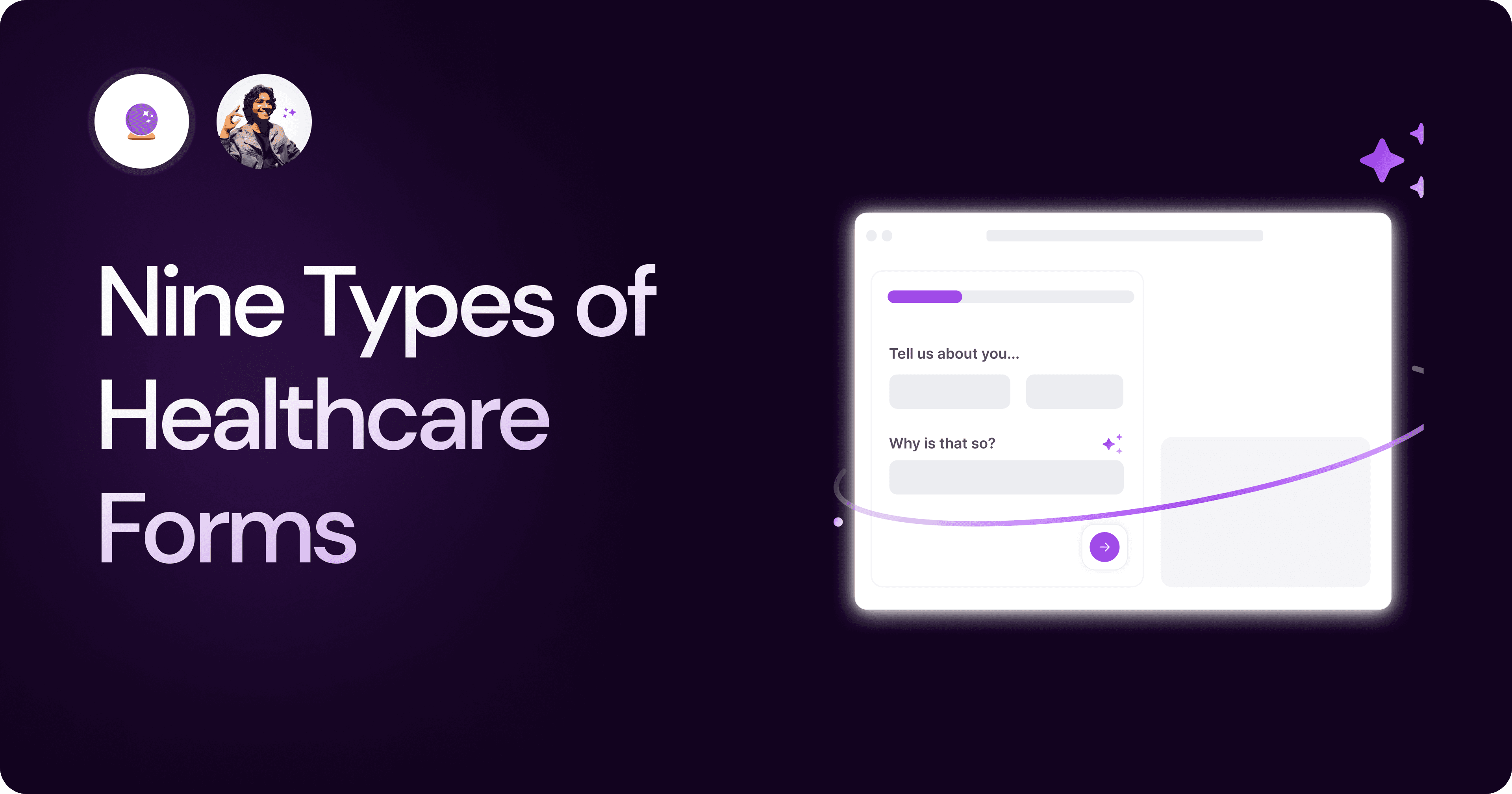
Nine Types of Healthcare and Medical Forms.
Medical forms are a must-have for any healthcare business or practitioner. Learn about the different kinds of medical and healthcare forms.
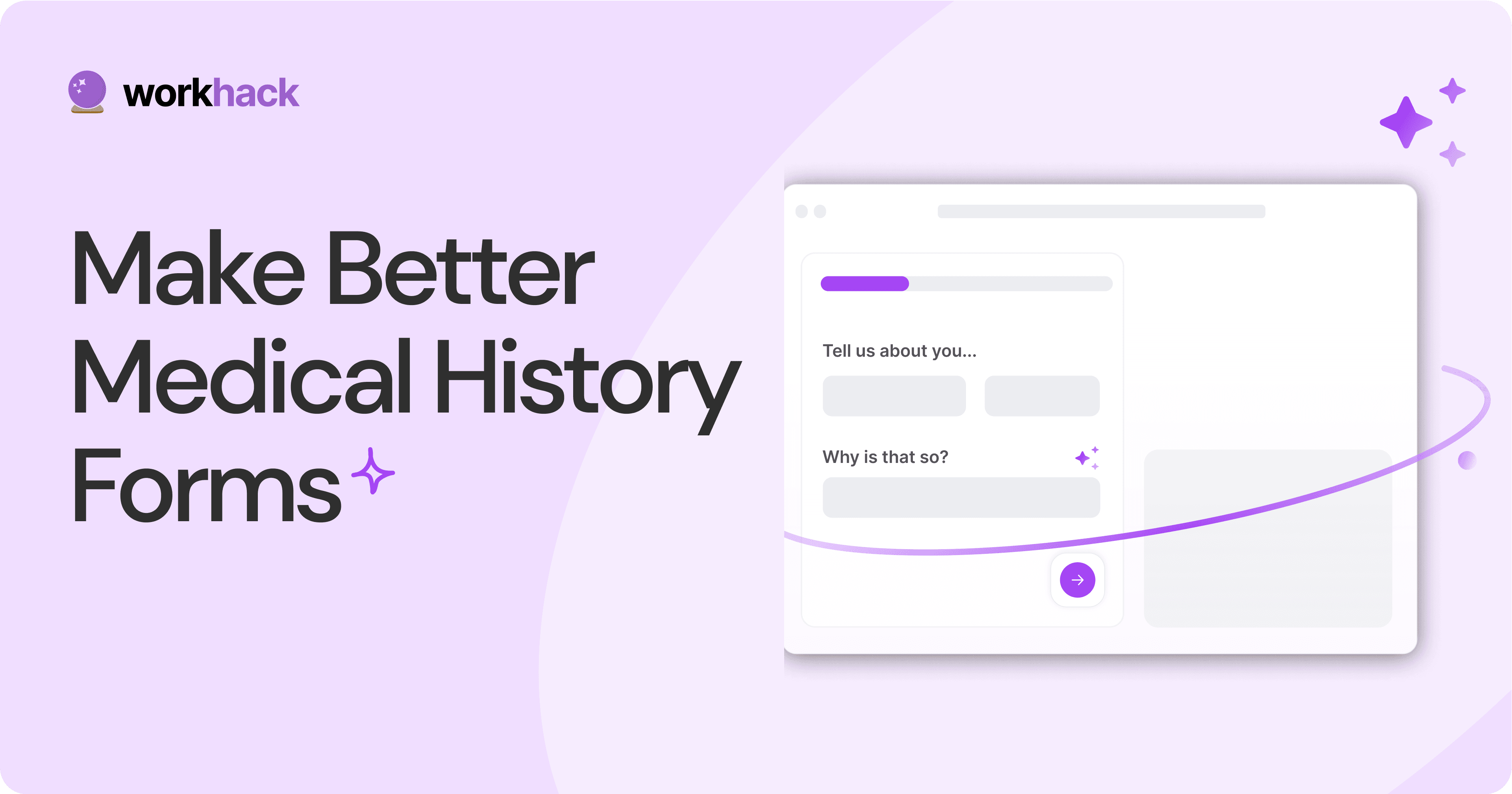
4 Tips for Better Medical History Forms.
Medical history forms are central to patient care, onboarding, and medical administration records. Learn how to make them easier to fill.
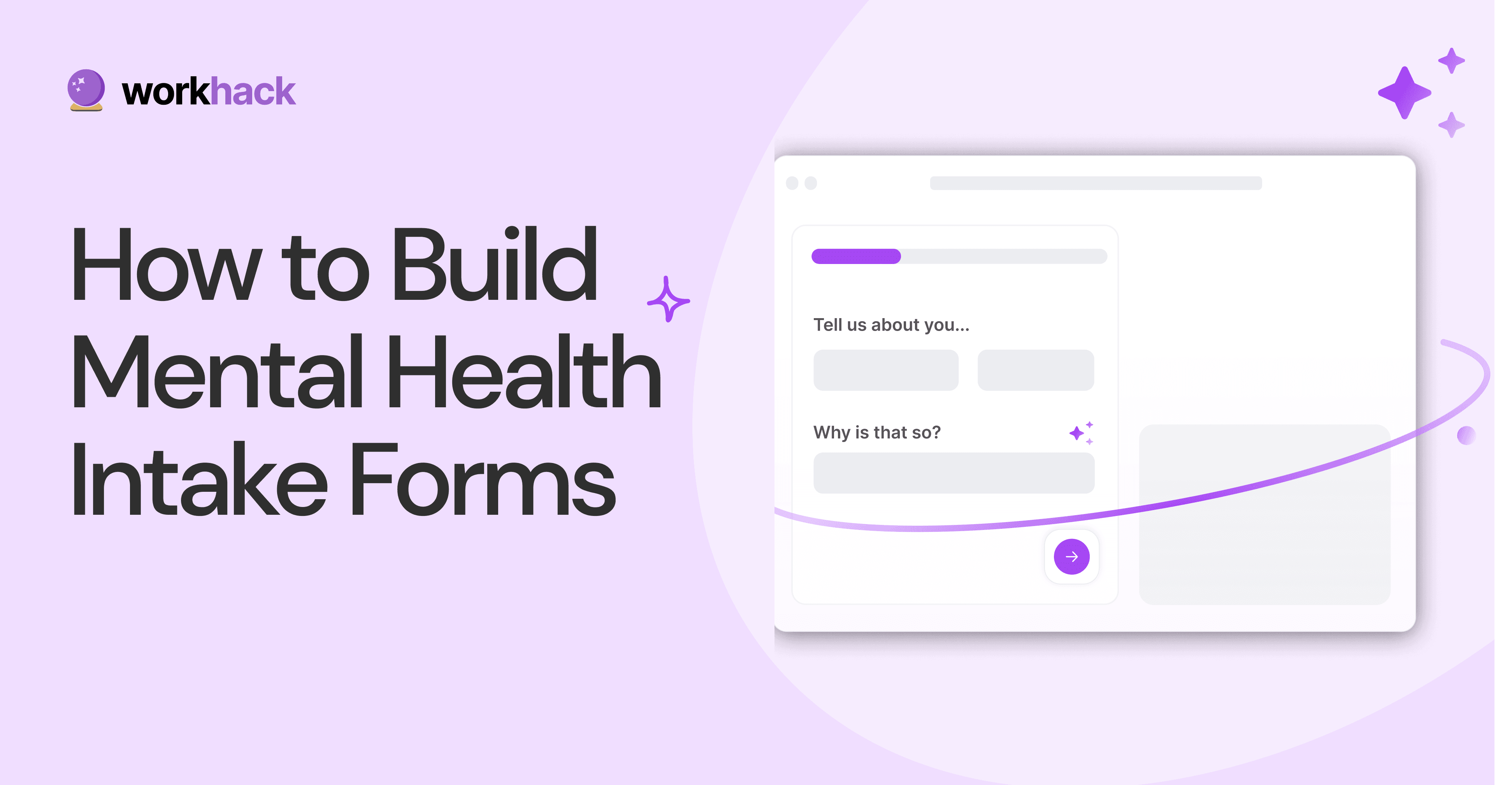
How to Build Mental Health Intake Forms?
Mental health intake forms are not like patient intake forms. Mental health intake forms deal with far more sensitive data and have specific design methods.
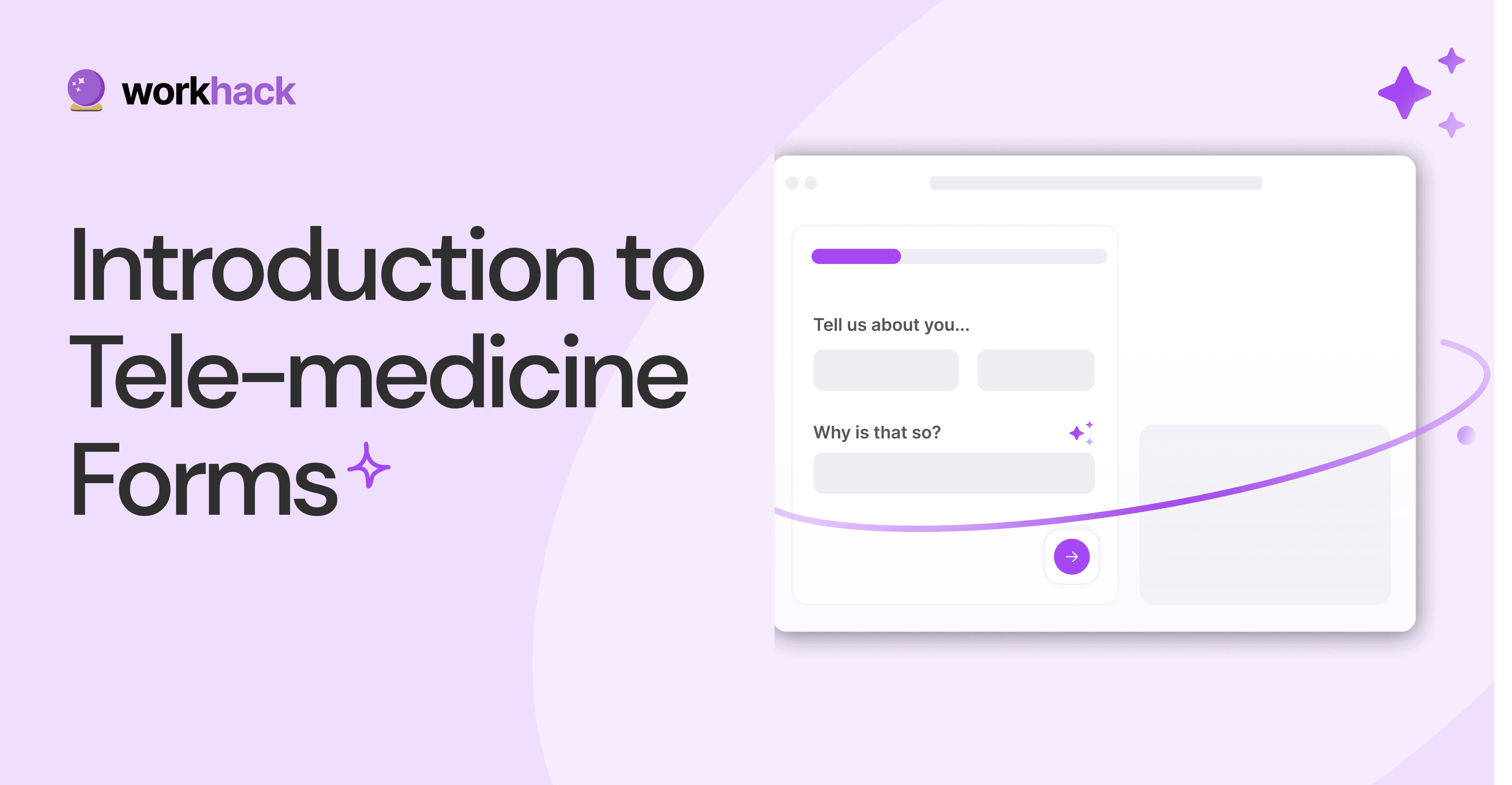
What, Why and How of Telemedicine Forms.
Telemedicine is on the rise and with different form builders out there, which one best suits your needs as a healthcare services provider?
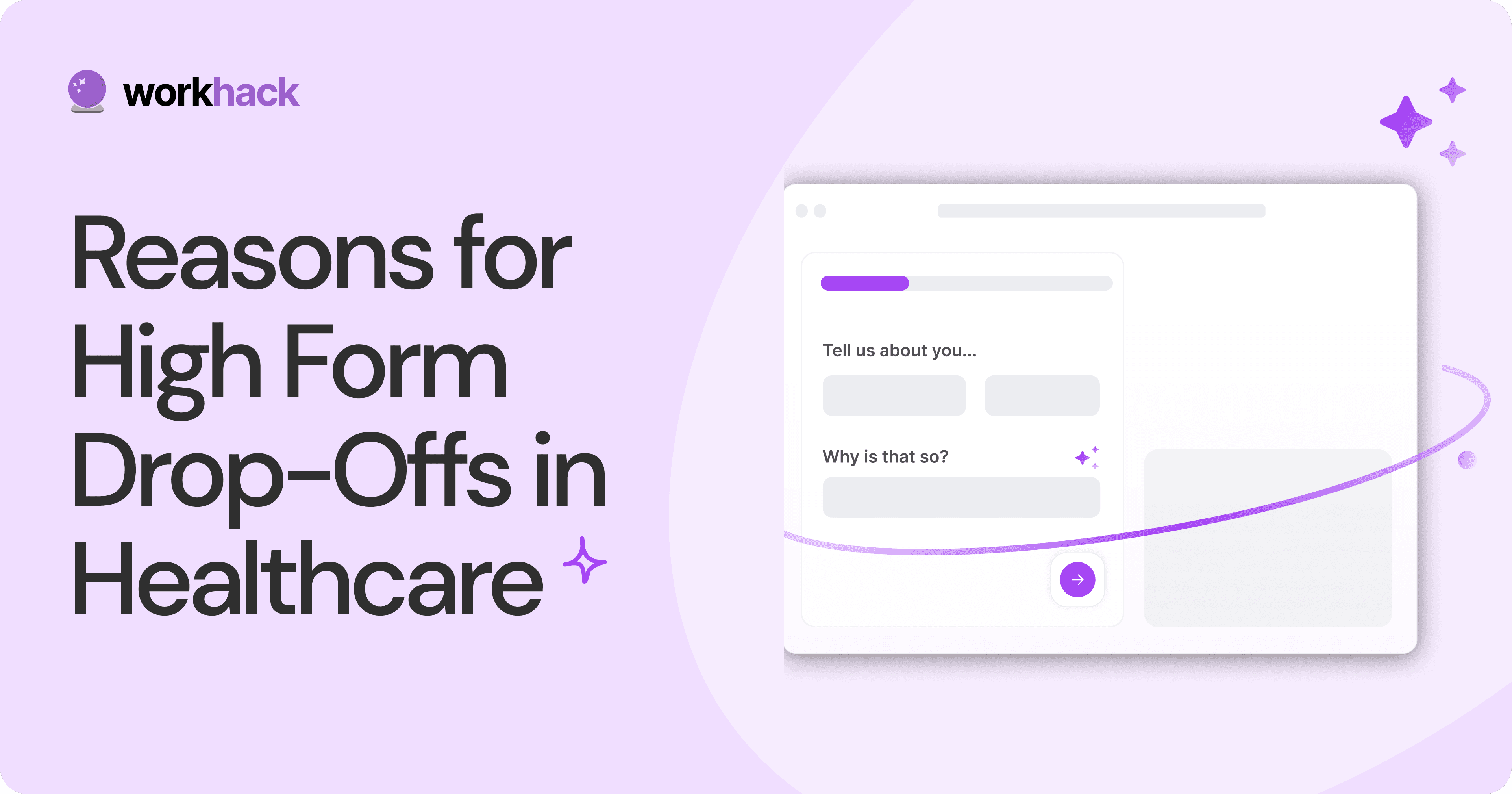
3 Reasons for Major Drop-Offs in Medical Forms.
No matter which healthcare form we pick, there are major drop-off reasons. We shall dive into the top 3 and learn how to resolve them in your next form.
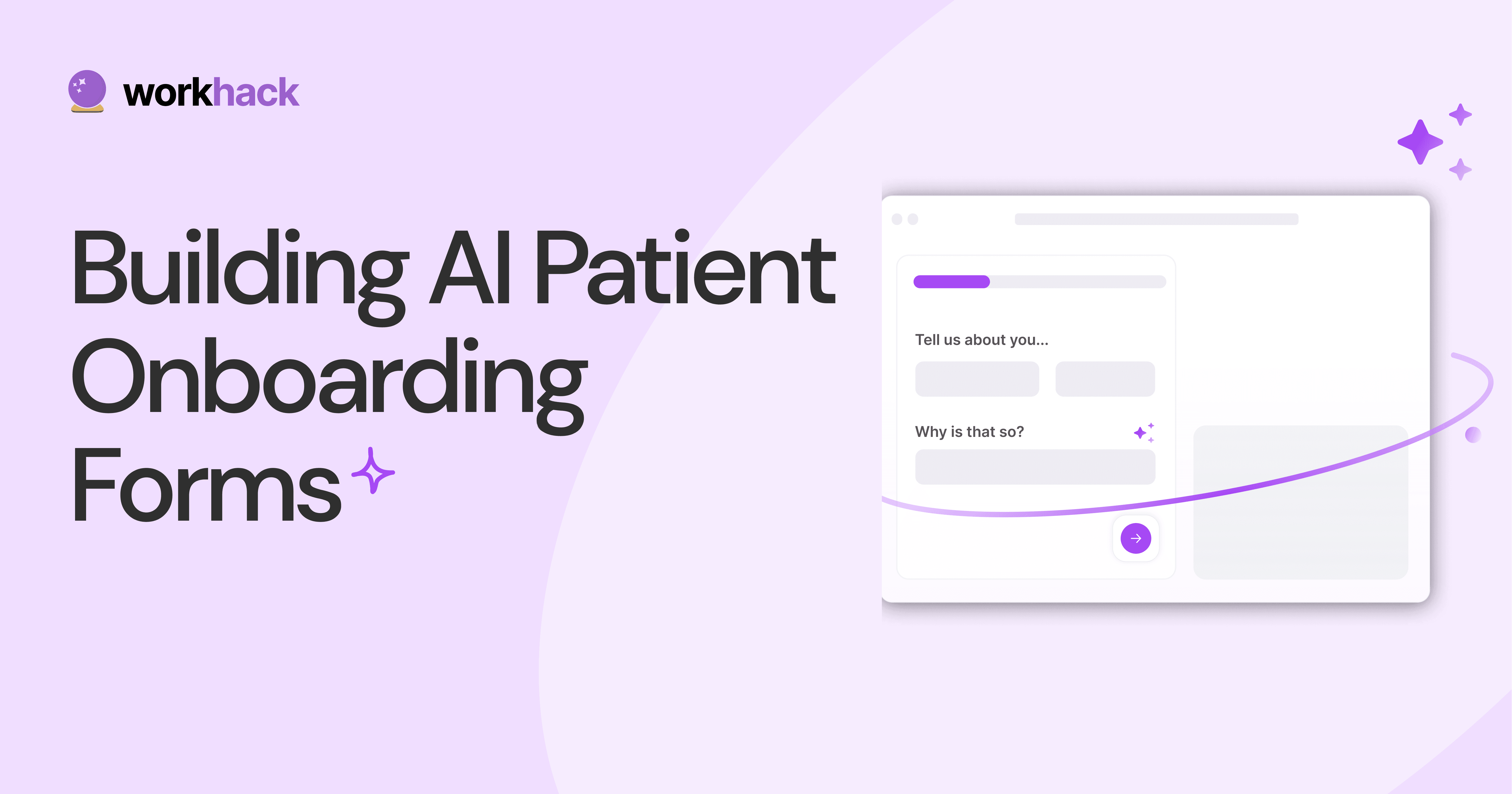
Patient Onboarding Forms - From Click to Clinic.
Patient onboarding forms are the first touchpoint for patients; getting this right for higher conversion rates is a must-have. Learn how to perfect them now.
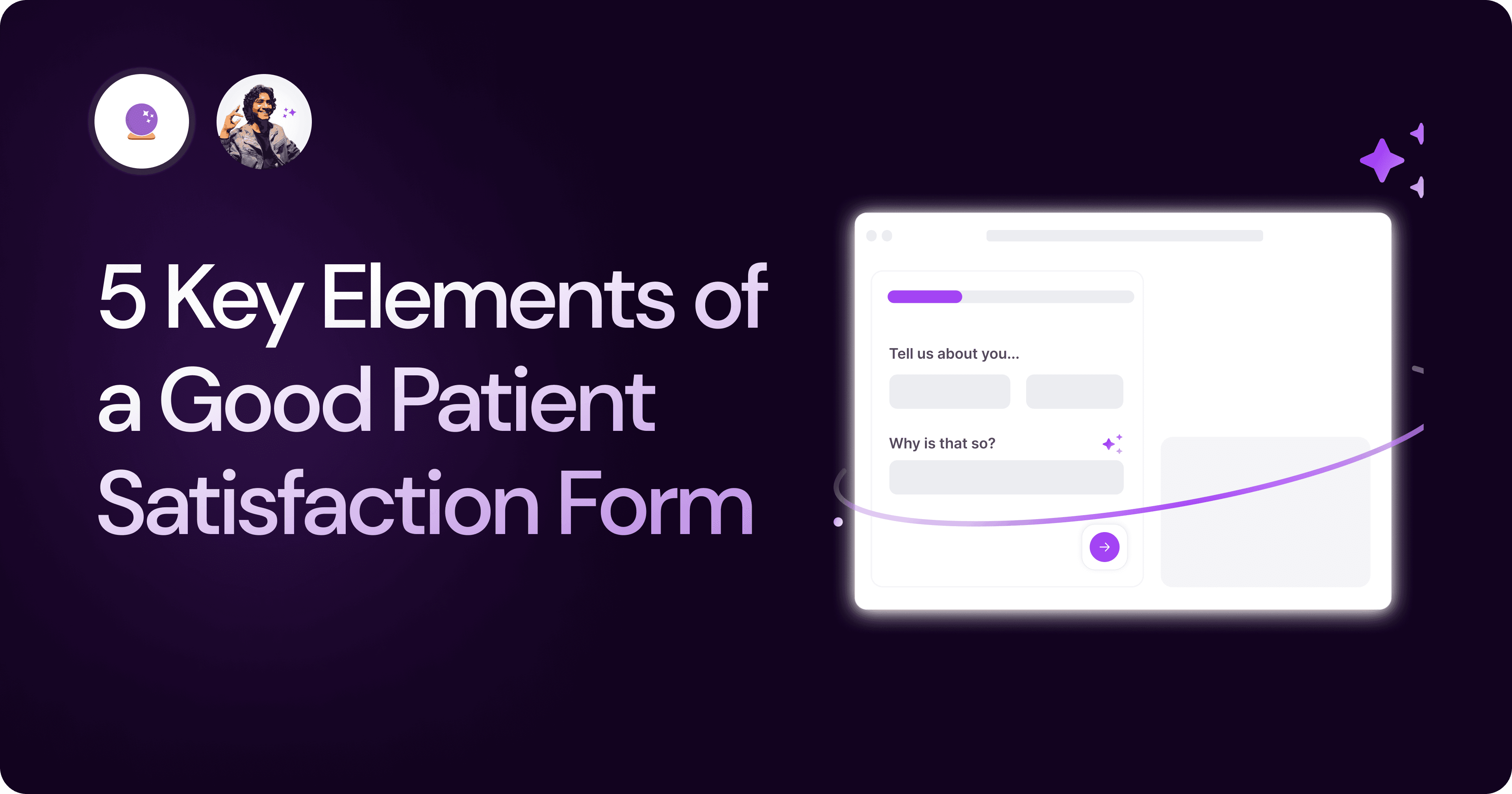
5 Key Parts of a Good Patient Satisfaction Form.
The goal of patient satisfaction surveys is to course-correct the services of a healthcare provider. Patient feedback leads to a culture of patient-centric care.
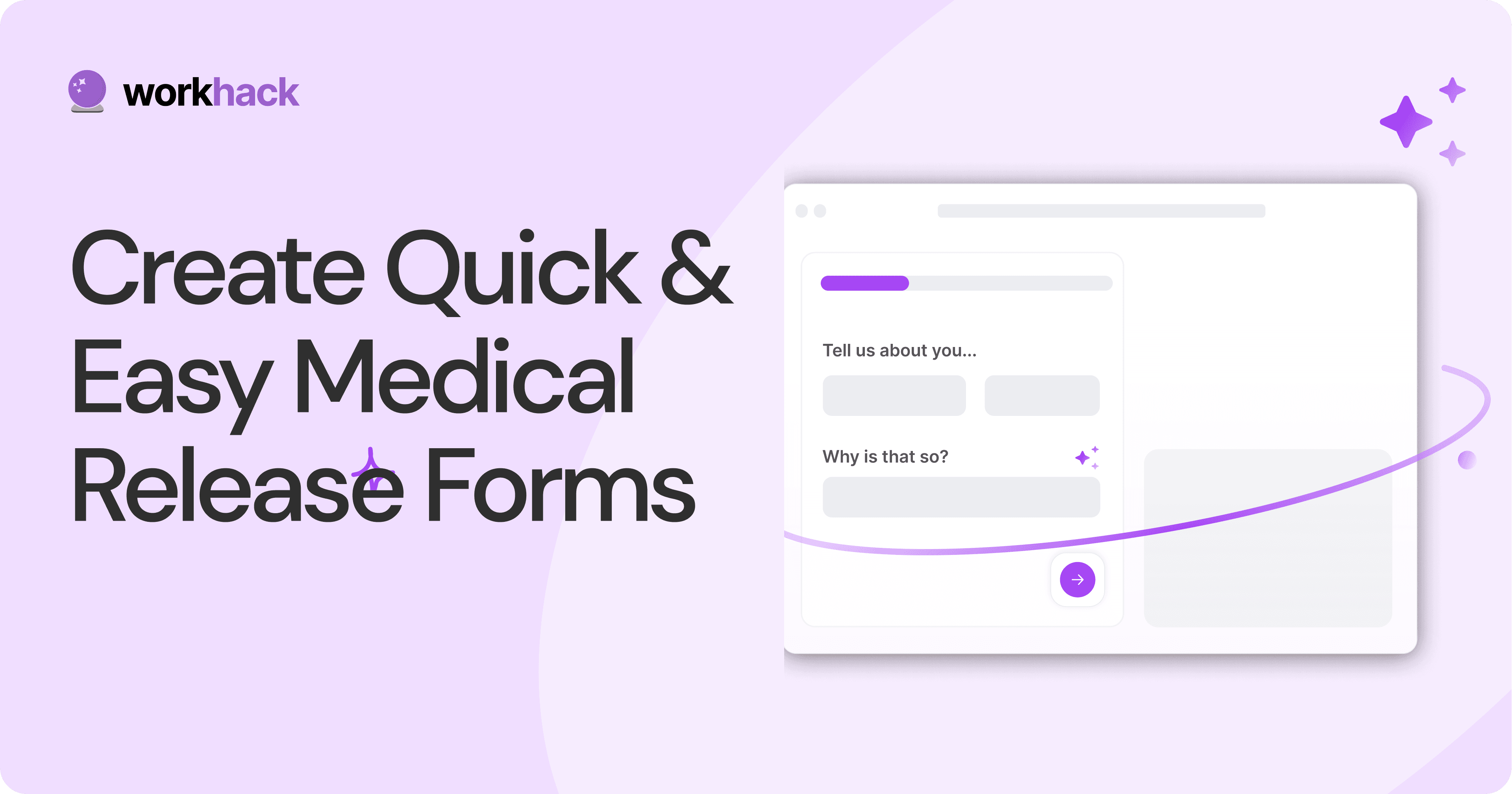
Build Quick and Easy Medical Release Forms.
Every HIPAA-compliant healthcare provider comes across medical release forms that involve details from medical history forms. Can they be shipped fast? Yes.

Nine Types of Healthcare and Medical Forms.
Medical forms are a must-have for any healthcare business or practitioner. Learn about the different kinds of medical and healthcare forms.

4 Tips for Better Medical History Forms.
Medical history forms are central to patient care, onboarding, and medical administration records. Learn how to make them easier to fill.

How to Build Mental Health Intake Forms?
Mental health intake forms are not like patient intake forms. Mental health intake forms deal with far more sensitive data and have specific design methods.

What, Why and How of Telemedicine Forms.
Telemedicine is on the rise and with different form builders out there, which one best suits your needs as a healthcare services provider?

3 Reasons for Major Drop-Offs in Medical Forms.
No matter which healthcare form we pick, there are major drop-off reasons. We shall dive into the top 3 and learn how to resolve them in your next form.

Patient Onboarding Forms - From Click to Clinic.
Patient onboarding forms are the first touchpoint for patients; getting this right for higher conversion rates is a must-have. Learn how to perfect them now.

5 Key Parts of a Good Patient Satisfaction Form.
The goal of patient satisfaction surveys is to course-correct the services of a healthcare provider. Patient feedback leads to a culture of patient-centric care.

Build Quick and Easy Medical Release Forms.
Every HIPAA-compliant healthcare provider comes across medical release forms that involve details from medical history forms. Can they be shipped fast? Yes.

Nine Types of Healthcare and Medical Forms.
Medical forms are a must-have for any healthcare business or practitioner. Learn about the different kinds of medical and healthcare forms.

4 Tips for Better Medical History Forms.
Medical history forms are central to patient care, onboarding, and medical administration records. Learn how to make them easier to fill.

How to Build Mental Health Intake Forms?
Mental health intake forms are not like patient intake forms. Mental health intake forms deal with far more sensitive data and have specific design methods.

What, Why and How of Telemedicine Forms.
Telemedicine is on the rise and with different form builders out there, which one best suits your needs as a healthcare services provider?

3 Reasons for Major Drop-Offs in Medical Forms.
No matter which healthcare form we pick, there are major drop-off reasons. We shall dive into the top 3 and learn how to resolve them in your next form.

Patient Onboarding Forms - From Click to Clinic.
Patient onboarding forms are the first touchpoint for patients; getting this right for higher conversion rates is a must-have. Learn how to perfect them now.

5 Key Parts of a Good Patient Satisfaction Form.
The goal of patient satisfaction surveys is to course-correct the services of a healthcare provider. Patient feedback leads to a culture of patient-centric care.

Build Quick and Easy Medical Release Forms.
Every HIPAA-compliant healthcare provider comes across medical release forms that involve details from medical history forms. Can they be shipped fast? Yes.

Nine Types of Healthcare and Medical Forms.
Medical forms are a must-have for any healthcare business or practitioner. Learn about the different kinds of medical and healthcare forms.

4 Tips for Better Medical History Forms.
Medical history forms are central to patient care, onboarding, and medical administration records. Learn how to make them easier to fill.

How to Build Mental Health Intake Forms?
Mental health intake forms are not like patient intake forms. Mental health intake forms deal with far more sensitive data and have specific design methods.

What, Why and How of Telemedicine Forms.
Telemedicine is on the rise and with different form builders out there, which one best suits your needs as a healthcare services provider?

3 Reasons for Major Drop-Offs in Medical Forms.
No matter which healthcare form we pick, there are major drop-off reasons. We shall dive into the top 3 and learn how to resolve them in your next form.

Patient Onboarding Forms - From Click to Clinic.
Patient onboarding forms are the first touchpoint for patients; getting this right for higher conversion rates is a must-have. Learn how to perfect them now.

5 Key Parts of a Good Patient Satisfaction Form.
The goal of patient satisfaction surveys is to course-correct the services of a healthcare provider. Patient feedback leads to a culture of patient-centric care.

Build Quick and Easy Medical Release Forms.
Every HIPAA-compliant healthcare provider comes across medical release forms that involve details from medical history forms. Can they be shipped fast? Yes.
Subscribe to stay updated.
Subscribe to stay updated.
Subscribe to stay updated.
HC

HC

HC

HC

70+ people from across industries read our emails.
HC

HC

70+ people from across industries read our emails.
HC

HC

HC

70+ people from across industries read our emails.




Bangalore, India / San Francisco, US
WorkHack Inc. 2023
Bangalore, India
San Francisco, US
WorkHack Inc. 2023
WorkHack Inc. 2023
Bangalore, India / San Francisco, US
WorkHack Inc. 2023
Bangalore, India / San Francisco, US



